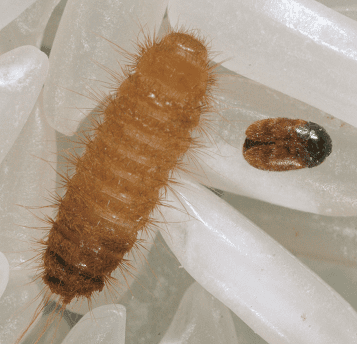
Heavy infestation under the flooring of a shipping container comprising larvae and larval skins. Photo: Department of Agriculture, Water and Environment
NEW import conditions will help protect Australia against khapra beetle, a highly invasive pest that poses a major threat to Australia’s grains industry.
Department of Agriculture, Water and the Environment (DAWE) Biosecurity & Compliance Group deputy secretary Andrew Tongue said an outbreak of khapra could cost Australia $15.5 billion over 20 years.
“Khapra beetle is not present in Australia, but we have recently seen an increase in khapra beetle interceptions as a hitchhiker pest in sea containers,” Mr Tongue said.
“Some of these detections have been in consignments that khapra beetle previously had no association with, and from countries not known to have khapra beetle.
“We are implementing urgent actions to reduce the risk of khapra beetle entering Australia.
“Khapra beetle destroys grain quality making it unfit for human or animal consumption.

Khapra beetle adult and larva on rice grains.
“It also poses a human health risk when stored products become contaminated with khapra beetle.
“The urgent actions are being implemented in phases and are resulting in changes in requirements for imported plant products and sea containers.”
Mr Tongue said phases 1-3 introduced requirements for high-risk plant products and phase 6 introduced requirements for sea containers.
“The next two phases start on 28 April 2022 and will introduce new requirements for other-risk plant products, and seeds for sowing, respectively.
“These plant products and seeds must now be inspected offshore by a government official of the exporting country and be certified (with a phytosanitary certificate) as being free from any species of Trogoderma (dead, alive or exuviae).
“These changes impact commercial importers but will also impact the general public.
“If you are bringing nuts or seeds into Australia via the mail or as an international traveller, you will need a plant health (phytosanitary) certificate.”
Habitat spreads
The khapra beetle is native to India, but has spread to parts of the Middle East, Asia, Africa and Europe.
It is most likely that the pest could make its way into Australia with stored produce including grain, rice, cottonseed, powdered milk and nuts, or in containers used storing or moving produce.
If a suspected khapra beetle is located, DAWE recommends not disturbing the insects, and to report the incident immediately by phoning 1800 798 636.
A photo and a sample of the infestation will assist DAWE in its investigations.
Source: Department of Agriculture, Water and the Environment

HAVE YOUR SAY